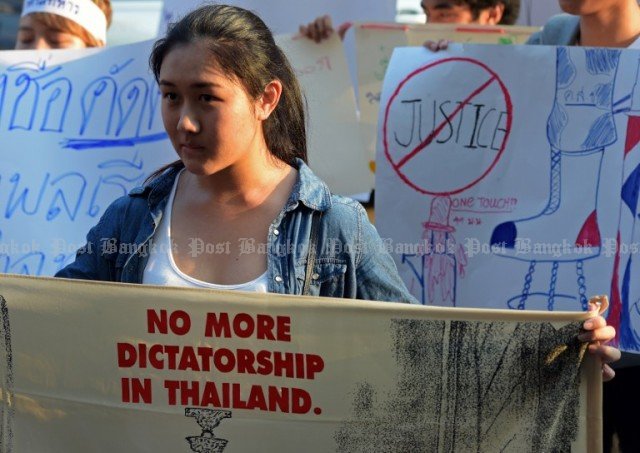
Rights groups are urging the government to stop holding trials of civilians in military courts.
They reiterated their calls after Prime Minister Prayut Chan-o-cha announced that the suspected Erawan shrine bombers would see their cases handled by a civilian court.
Gen Prayut said on Tuesday that the cases were serious for both Thai and foreign suspects allegedly involved in the deadly blasts and the justice process had to be universally acceptable. Earlier, police reportedly planned to transfer the cases to military courts.
Gen Prayut made his remarks after police sought approval from the Min Buri Court to detain Yusufu Mieraili, 25, a prime suspect in the Erawan shrine blast for questioning, who was handed over to police on Monday and had spent the previous week in military custody.
Mr Mieraili, according to his passport, is a Chinese citizen from China's western autonomous region of Xinjiang. He was arrested on Sept 1 and detained in Sa Kaeo province before being moved to the 11th Military Circle in Bangkok for further detention.
Police said Mr Mieraili admitted he handed a bomb inside a backpack to a man wearing a yellow T-shirt at Hua Lamphong railway station before the man subsequently planted the device at the Erawan shrine on the evening of Aug 17. It killed 20 people and injured 130 others when it exploded.
Yaowalak Anuphan, head of the Thai Lawyers for Human Rights Centre, said all civilians should be tried in a civilian court only, regardless of the charges they face.
However, not long after last year's military coup, the National Council for Peace and Order (NCPO) made it a mandatory policy under announcement 37/2557 that any criminal cases relating to national security be tried in military courts.
Military judicial procedures tend to take longer and are less transparent than civilian courts, said Yingcheep Atchanont, manager of the iLaw legal information centre.
The judges are also military men themselves, Mr Yingcheep said.
The NCPO's order, widely decried by human rights agencies and the international community, has been used sweepingly in politically-motivated cases which have involved critics of the regime, human rights defenders say.
According to iLaw, over 700 suspects were tried in military courts since the May 22 coup d'etat last year, including 144 political cases.
Such political cases include lese-majeste and sedition charges, as well as violations of the NCPO'S ban on public assembly and restrictions on public speech. iLaw's definition also covers cases of political violence.
However, Gen Prayut said on Tuesday that the Erawan shrine bomb suspects would face a civilian court.
He argued that the suspects were foreigners and he wished for the judicial procedure to be recognised as legitimate by the international community.
"In saying so, Gen Prayut is admitting that civilians being tried in military courts goes against international norms," Ms Yaowalak said.
The human rights lawyer urged that Thai defendants facing military trials receive the same fair and equal treatment the suspected bombers will allegedly receive.
But if the NCPO wishes to have international recognition, it should stop the military trials of civilians altogether, she said.
Mr Yingcheep argued that the government should not apply double standards to Thais and foreigners, comparing the recent Erawan blast case to the bomb which went off at Bangkok's Criminal Court, where suspects were tried in a military court.
"The decision by the NCPO to have the bomb suspects face a civilian court shows that its criteria is arbitrary," he said.